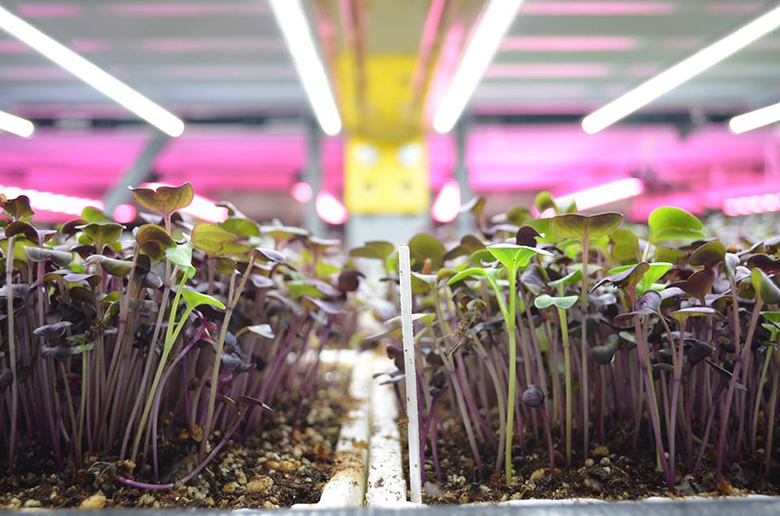
Steps away from trucks rumbling down Johnson Avenue in one of the most industrial sections of Bushwick, hundreds of hybrid striped bass and salmon swim against a gentle current inside 400-gallon blue tanks in a cramped, humid room. Two stories above, kale, cabbage and broccoli microgreens sprout under glowing LED lights, their growth fueled by waste from the fish.
Read more: A Guide to Vertical Farming Techniques
“This is our lab,” says Edenworks co-founder and CEO Jason Green. “We have years of data at this point.”
Edenworks is one of three aquaponic operations in the neighborhood—along with Oko Farms and Verticulture—that has been experimenting with growing fish and greens concurrently as a model for sustainable urban agriculture over the past few years.
https://www.instagram.com/p/BvrW2_bFRO1/
Now, its microgreen blends are selling well at Whole Foods, and Green and his team are poised to be the first to apply their pilot experiments and data to scaling up. Green says a new farm will open next year (although he’s not ready to share an exact date or location) and that Edenworks’ produce will be sold across the Northeast within the next 36 months.
Key to their success, Green says, is that he’s figured out how to optimize conditions for the fish and plants, generating high yields on greens and creating a nearly pathogen-free ecosystem, at a time when food safety related to greens is a growing concern. “We’re changing the environment to create a farm that is structurally resistant to disease,” he says.
The Fish and Farm Market
As wild fish stocks have been depleted around the globe, farming them has increasingly been seen as an attractive alternative. Aquaculture systems, however, can be notoriously bad for the environment, by disrupting adjacent ecosystems when offshore pens are used, for example, and by depleting the ocean of small wild fish used for feed. Innovators have been looking for better ways to execute it, and aquaponics is one such approach. “Farming fish is like farming everything else; there are good practices and bad practices,” Green says.
Read more: The Questions You Should Be Asking About Farmed Fish
Aquaponics also taps into the increasing excitement (especially in technology and investment realms) around growing vegetables hydroponically indoors. Brooklyn is now home to Gotham Greens and Square Roots; AeroFarms and Bowery are just across the river in New Jersey; and Farm.One grows underground in Manhattan.
Microbes and Microgreens
https://www.instagram.com/p/BtLeaYhlHN0/
In traditional aquaponic systems, fish swim in tanks below the plants, producing waste that the plants use to grow, but Green says that setup involves lots of trade-offs, since fish and plants don’t necessarily thrive in the same environment.
Edenworks’ approach is more complex, but by separating the fish and plants, he’s able to create ideal conditions for each, which in turn increases yields and makes it easier to control for disease.
Read more: Can Indoor Agriculture Really Transform Local Food?
Essentially, the fish produce waste, and the water containing that waste is then mechanically filtered with the help of bacteria. “Instead of brewing beer, we’re brewing fertilizer,” Green says. That nutrient-rich water is then pumped up to the plants.
The plants, meanwhile, are floating on the water in trays. Their roots reach into the water through a soilless potting mix that contains bacterial and fungal cultures that help the plants access and utilize the nutrients they’re absorbing. “So there’s this symbiotic relationship where the bacteria are living around the plant roots, they’re taking the nutrients, they’re absorbing part of that, and they’re delivering the rest to the plant,” Green explains. “All of that symbiosis is what enables our plant health.”
Edenworks’ Future
https://www.instagram.com/p/BvwNveqlpDN/
Green says that approach to plant health has enabled Edenworks to cut its crop disease down to 1 percent per harvest and to log more than 18 months so far with zero detectable levels of E. coli. He also says the farm is achieving yields that are more than double the average yields of indoor hydroponic farms.
Edenworks hasn’t sold its fish yet, but the team has harvested and processed it to evaluate yields. Green says on the sustainability front, he’s working on improving feed ratios and hoping that feeds made without wild fishmeal will soon be available.
But a larger scale will be necessary to make selling the fish a commercially viable proposition—and that’s where things will get interesting. Baby greens and herbs grown in a warehouse steps away from the Brooklyn supermarket selling them may now seem commonplace, but a substantial source of protein and calories from within the same distance is still pretty much unheard of.



